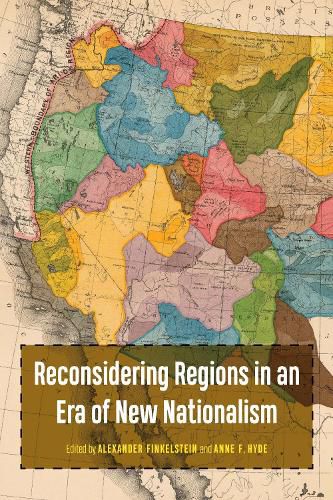Readings Newsletter
Become a Readings Member to make your shopping experience even easier.
Sign in or sign up for free!
You’re not far away from qualifying for FREE standard shipping within Australia
You’ve qualified for FREE standard shipping within Australia
The cart is loading…






Regions connect and divide us even as global economies, weather, and germs batter us. Historians, literary scholars, and social scientists use region to ground and challenge ideas about national belonging. In Reconsidering Regions in an Era of New Nationalism Alexander Finkelstein and Anne F. Hyde have assembled leading scholars of regionalism to discuss the relationship of region to nation.
The contributors explore how historical forces have changed regional associations and how regional associations have changed culture and history. The themes of culture, space, and institutions organize this volume: contributors historicize how race and racial thinking have evolved as a major force to define region and nation over time; the essays raise questions about the stability and validity of "canonical regions" in U.S. history to find new complexity in how these blocs form and how they understand themselves; and they focus on historicist and conjunctural trends in how institutions and ordinary people conceive regions through political and cultural processes over time. Challenging ideas about both national belonging and local association, the contributors emphasize how regional analysis deepens understanding of migration, race, borders, infrastructure, climate, and Native sovereignty.
$9.00 standard shipping within Australia
FREE standard shipping within Australia for orders over $100.00
Express & International shipping calculated at checkout
Regions connect and divide us even as global economies, weather, and germs batter us. Historians, literary scholars, and social scientists use region to ground and challenge ideas about national belonging. In Reconsidering Regions in an Era of New Nationalism Alexander Finkelstein and Anne F. Hyde have assembled leading scholars of regionalism to discuss the relationship of region to nation.
The contributors explore how historical forces have changed regional associations and how regional associations have changed culture and history. The themes of culture, space, and institutions organize this volume: contributors historicize how race and racial thinking have evolved as a major force to define region and nation over time; the essays raise questions about the stability and validity of "canonical regions" in U.S. history to find new complexity in how these blocs form and how they understand themselves; and they focus on historicist and conjunctural trends in how institutions and ordinary people conceive regions through political and cultural processes over time. Challenging ideas about both national belonging and local association, the contributors emphasize how regional analysis deepens understanding of migration, race, borders, infrastructure, climate, and Native sovereignty.